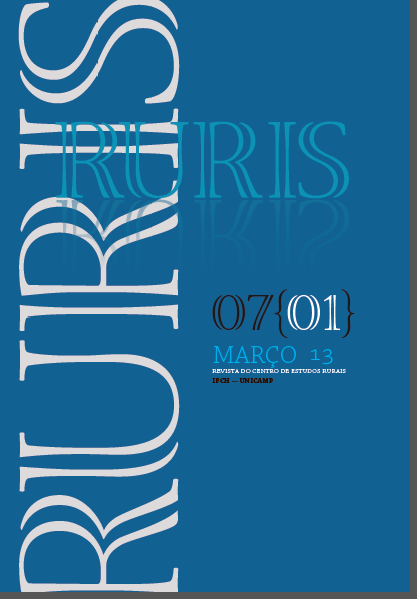Abstract
In this paper, the intention is to make a map of discontinuities/ continuities that structure the relationships between beneficiary family farmers from Bolsa Família Program (PBF) and the State that produces and manages this program in addition to the symbolic-normative system which it has been part of. For the preparation of this map, the ways in which the farmer takes ownership of PBF will be considered. Also, there will by analysis on how it becomes a beneficiary and remakes, in the relationship towards the symbolic-normative system, the plots that constitutes its ordinary life, involving the structure of habits, social arrangements and the ways to produce territories. At work, researchers’ look focused, first, on the family unit and the framework in which relationships are shown in more dense forms. It extended along the paths of the family members (men and women, parents and children, adults, youth and children) in the production of goods and territories. For the production of information, documents and databases from the State provided clues, the immersion in the world of families ended up bringing qualified information. Based on the results of the study, it is possible to scale the size of the action of “creative destruction” of the State-producer/symbolic-normative system operator-in family agriculture from semi-arid of Bahia, in addition to the new place of the farmer, which resizes the border itself in social/human production.References
CODES - CONSELHO REGIONAL DE DESENVOLVIMENTO RURAL SUSTENTÁVEL DA BACIA DO JACUÍPE. Plano Territorial de Desenvolvimento Sustentável. Território Bacia do Jacuípe, 2010. Disponível em: http://territoriobaciadojacuipe.blogspot.com/p/o-ptds.html. Acesso em: 23 out. 2011.
DURKHEIM, E. e MAUSS, M. De quelques formes primitives de classification - contribution à l’étude des représentations collectives. In: Année sociologique, 6 (1903). Disponível em: http://classiques.uqac.ca/classiques/mauss_marcel/essais_de_socio/T7_formes_classification/formes_classification.pdf.
FAVERO, C. A. Encontros e desencontros nos modos de produzir a vida. Entre seres de necessidades e seres desejantes. In: ANDRADE, E. S. e SILVA, F.P. Estado e políticas públicas. a construção do consenso neoliberal. Salvador: EDUNEB, 2012, p. 197-246.
GIDDENS, A. As consequências da modernidade. S. Paulo: Ed. UNESP, 1991.
GIDDENS, A. A constituição da Sociedade. São Paulo: Martins Fontes, 2003.
HARVEY, D. Neoliberalismo como Destruição Criativa. INTERFACEHS – Revista de Gestão Integrada em Saúde do Trabalho e Meio Ambiente 2 (4). Tradução, Agosto de 2007. Disponível em: www.interfacehs.sp.senac.br.
HEGEL, G. W F. Fenomenologia do espírito. Vol. I e II. 2.Ed. Petrópolis: Vozes, 1992.
HEGEL, G. W. F. Enciclopédia das Ciências Filosóficas, III, A Filosofia do Espírito. São Paulo: Edições Loyola, 1995.
MARTINS, J. de S. O tempo da fronteira. Retorno à controvérsia sobre o tempo histórico da frente de expansão e da frente pioneira. Tempo Social, Rev. Sociol. USP 8(1), S. Paulo, p. 25-70, maio de 1996.
MARTINS, J. de S. Fronteira: a degradação do outro nos confins do humano. São Paulo: Contexto, 2009
MARX, K. Manuscrits de 1844. (Économie politique e philosophie). Présentation, traduction et notes d’Émile Bottigelli. Paris: Les Éditions Sociales, 1972.
SABOURIN, E. Camponeses no Brasil. Entre a troca mercantil e a reciprocidade. Rio de Janeiro: Garamond, 2009.
SANTOS, M. O Dinheiro e o Território. Geografia, ano 1, n.1, Rio de Janeiro, p.8-9, jan-jun 1999.
VEIGA, J. E. A dimensão rural do Brasil. Programa de Seminários Acadêmicos. 5ª feira FEA-USP. Seminário nº 4/2004. Disponível em: http://www.econ.fea.usp.br/seminarios/artigos/dimensao_rural.pdf.
WANDERLEY, M. N. B. O mundo rural como espaço de vida – reflexos sobre a propriedade da terra, agricultura familiar e ruralidade. Porto Alegre: UFRGS Editora, 2009.

This work is licensed under a Creative Commons Attribution-NonCommercial-NoDerivatives 4.0 International License.
Copyright (c) 2014 RURIS (Campinas, Online)

